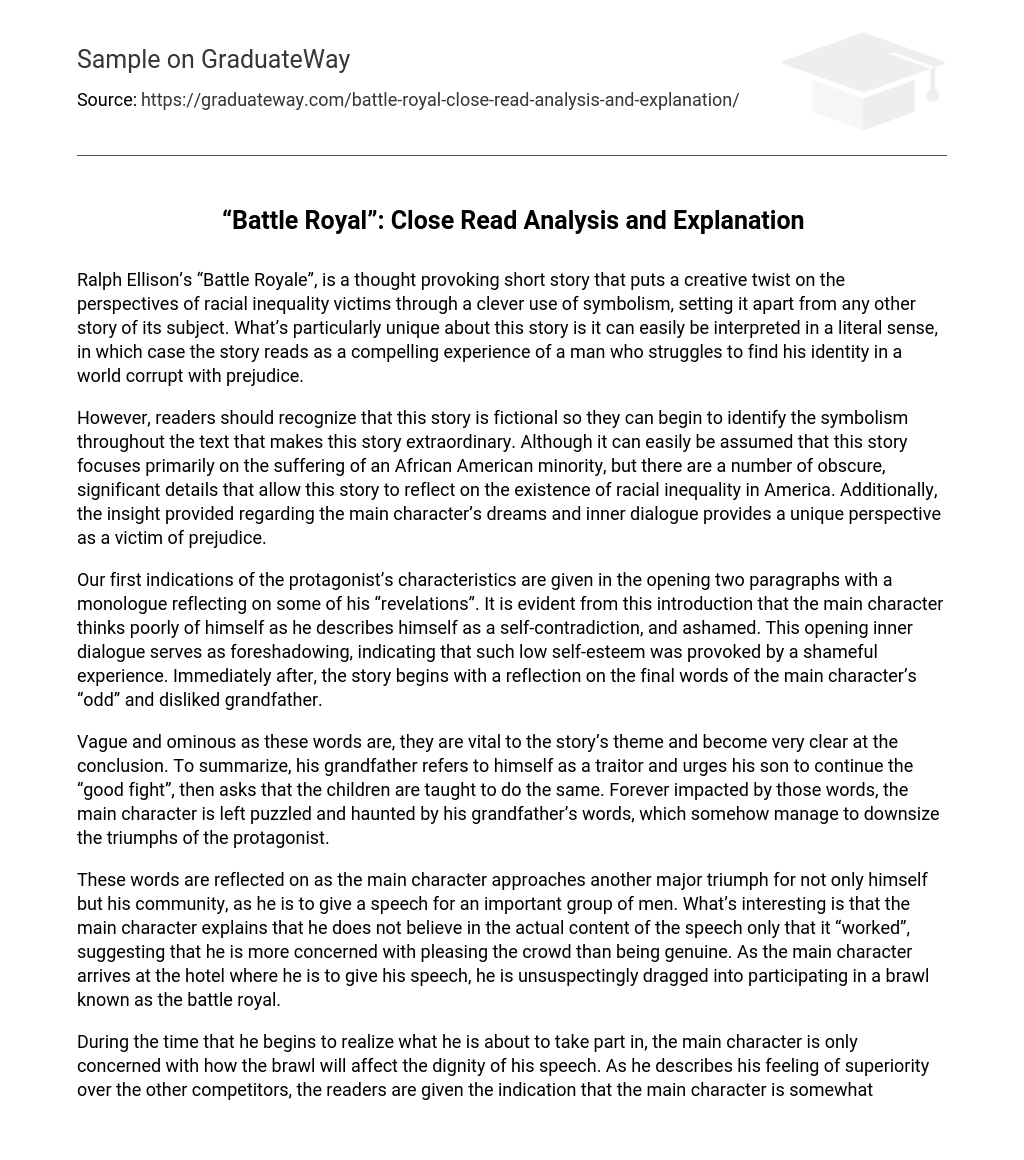Ralph Ellison’s “Battle Royale” is a thought-provoking short story that uses symbolism to illuminate the perspectives of individuals experiencing racial inequality. What makes this story unique is its imaginative approach, allowing it to be understood both literally and metaphorically. In literal terms, it presents a captivating narrative of self-discovery in a biased society.
Readers must understand that this story is fictional, enabling them to explore the symbolism within it, which distinguishes it from others. While the story seems to center on African American challenges, there are various subtle yet important components that highlight racial inequality in America. Additionally, comprehending the protagonist’s aspirations and inner thoughts offers a distinct viewpoint on being a victim of prejudice.
The initial paragraphs serve to introduce the protagonist’s personality traits through a monologue. In this introspective dialogue, he contemplates certain “revelations” and it becomes evident that he views himself negatively, describing himself as contradictory and ashamed. These opening lines hint at the main character’s low self-esteem, which seems to stem from a shameful experience. Following this, the narrative proceeds by delving into an examination of the main character’s grandfather, who was perceived as “odd” and disliked. The focus is specifically on his last words.
The story centers around the protagonist’s grandfather, who proclaims himself a traitor and urges his son to continue the “good fight” and teach the children to do so as well. While initially unclear and foreboding, these words have a significant influence on the narrative and become apparent later on. They deeply affect the main character, leaving him confused and haunted by his grandfather’s statement. As a result, this alters how the protagonist views his own accomplishments.
The main character reflects on these words as he approaches another major triumph for himself and his community: giving a speech to an important group of men. Interestingly, he admits that he does not believe in the content of the speech, but only cares that it is effective. This suggests that his priority is pleasing the crowd rather than being genuine. Upon arriving at the hotel where the speech will take place, the main character is unexpectedly forced to participate in a brawl called the battle royal.
The main character is preoccupied with the impact of the brawl on his speech’s dignity as he becomes aware of his upcoming involvement. His superiority complex and concern for his social standing are evident as he expresses his sense of superiority over the other contestants. As he tries to comprehend his chaotic situation, a naked woman suddenly appears and dances for the men in the room, further adding to his confusion.
She is considered one of the most powerful symbols in the story, embodying the American dream and prompting readers to react to her. When she enters, the room falls silent, with everyone captivated by her beauty. The main character experiences conflicting emotions towards her, ranging from adoration to a desire to harm her. These contradictions represent his longing to be part of the American dream, mixed with resentment and frustration over his inability to attain it.
All the while, the white men in the room make the competitors witness the performance, teasing them with an ideal that they will never have. Eventually, the dancer is seized and mistreated by the white men in the room, representing how a prejudiced mindset gives dominant control to the majority, especially the affluent and influential, over American values. This manipulative control over what is considered “right or wrong” is a recurring theme in this narrative and aids in comprehending the grandfather’s initial quote.
Soon after the dancer is removed from the room, the boxers, including the main character, are instructed to fight each other blindfolded in a chaotic frenzy. After a prolonged period of this disordered brawling, the blindfolds are ultimately removed for a boxing match between the main character and the other remaining opponent. The main character soon recognizes that he is inferior to his opponent and tries to offer money in exchange for winning. However, not only does the challenger reject the offer but he states that he is fighting for his own sake rather than for the audience.
The main character’s involvement in a brutal fight with white men is noteworthy because he willingly participates in order to gain their approval, despite being coerced. Despite feeling terrified and threatened, the main character still remains focused on delivering a good speech, almost as if he has been indoctrinated to believe enduring such a beating is necessary.
In the story, the main character suffers through cruel and humiliating actions to entertain the spectators. In time, he is compelled to give a speech while injured and bruised. The crowd disregards him and continually ridicules him with sarcastic remarks. While delivering his speech, he unintentionally says “social equality,” which causes a brief pause followed by intense hostility. As readers, we sympathize with his predicament and comprehend that he was in a perilous situation but made the conscious decision not to acknowledge his mistake.
At the conclusion of the speech, the main character receives a suitcase and a scholarship to an African American college. Despite realizing that his efforts to attain these rewards were not truly meaningful, the protagonist is overjoyed by this “achievement”. However, it is only when he has a dream involving his grandfather that he fully understands how much he has demeaned himself. By tirelessly working towards gaining approval from the white community, the protagonist has essentially become a puppet, performing physically demanding tasks solely for their entertainment and enjoyment.
Both the main character and his grandfather share a desire for social equality. However, the main character’s grandfather emphasizes the importance of actively fighting for equality rather than passively seeking approval from the majority. As a result, the main character has sacrificed his own dignity in pursuit of societal acceptance, preventing him from enjoying any personal accomplishments. This story is notable for its profound symbolism, distinguishing it from other narratives about the challenges of social inequality.





